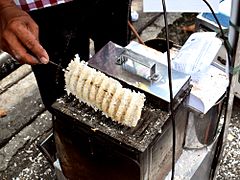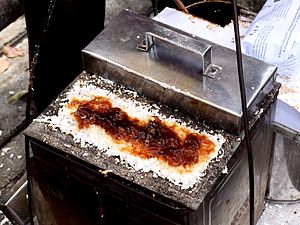Kue rangi facts for kids

Freshly baked kue rangi just being pulled up from the special metal mold.
|
|
| Alternative names | Sagu rangi |
|---|---|
| Type | Baked coconut cake |
| Course | Snack |
| Place of origin | Indonesia |
| Region or state | Jakarta and West Java |
| Serving temperature | Warm or room temperature |
| Main ingredients | tapioca starch, grated coconut, palm sugar, |
| Similar dishes | kue pancong, kue pukis |
Kue rangi, also called sagu rangi, is a yummy traditional snack from Indonesia. It's a type of kue, which means a traditional cake or pastry. This tasty treat is made from a batter of coconut and starch. It's cooked in a special pan, making it a popular snack, especially in Jakarta. Some people even call it an Indonesian coconut waffle!
The special pan used to make kue rangi looks a bit like a muffin tin. But instead of round cups, it has small rectangular shapes. These shapes give the kue rangi its unique half-moon or boat-like look. This same type of pan is also used for other Indonesian cakes like kue pancong and kue pukis. However, kue rangi's pan has smaller holes, and the cakes usually stay connected, making them look a bit like a waffle.
Making Kue Rangi: Ingredients and Cooking
To make this delicious cake, people mix tapioca starch (which some call sago flour) with grated coconut and a pinch of salt. They add water to make a smooth batter. This batter is then poured into the special metal mold. The mold is placed on a small stove to bake. Compared to a similar cake called kue pancong, kue rangi has a drier texture.
Kue rangi is usually served with a sweet sauce. This sauce is made from liquid brown sugar or coconut sugar. A little starch is added to make the sauce thick and slightly gooey. Sometimes, people add pieces of jackfruit or pineapple to the sauce for a fruity smell and taste. A pandan leaf might also be added for a pleasant aroma. Traditionally, kue rangi is cooked over a wood-fueled stove. This gives the freshly baked cakes a lovely smoky smell.
Kue Rangi vs. Similar Cakes
Kue rangi, kue pancong, and kue pukis are often confused because they look similar. But they have some key differences!
- Kue rangi uses tapioca starch and grated coconut. It does not use coconut milk, eggs, or yeast. It has a dry and chewy texture. It's usually topped with liquid brown sugar.
- Kue pancong uses rice flour and grated coconut. It uses coconut milk and eggs, but no yeast. It has a soft and moist texture. It's often topped with sugar granules.
- Kue pukis uses wheat flour and does not use grated coconut. It uses coconut milk, eggs, and yeast. It is mostly soft in texture. It's often topped with chocolate sprinkles.
 | Tommie Smith |
 | Simone Manuel |
 | Shani Davis |
 | Simone Biles |
 | Alice Coachman |


